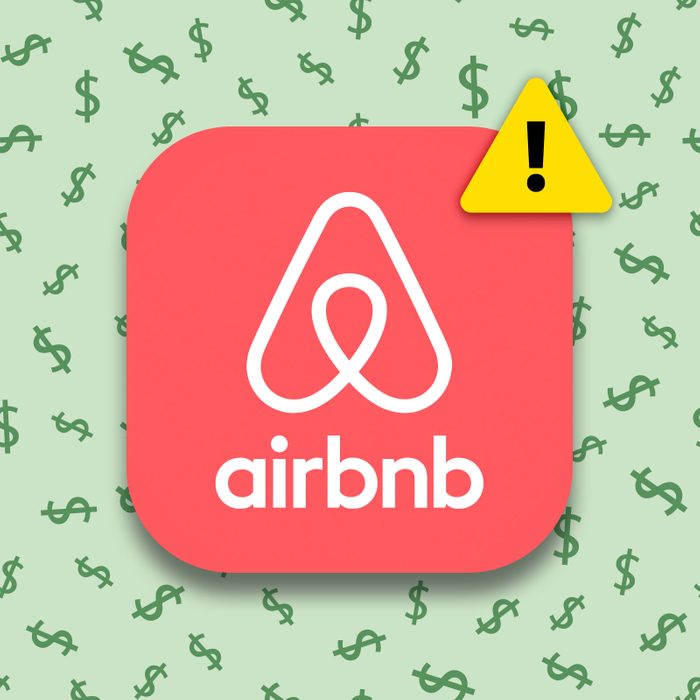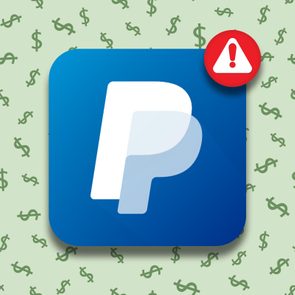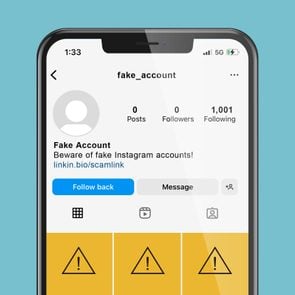The 6 Most Common Airbnb Scams and How to Avoid Them
Updated: Jul. 15, 2024

Short-term rentals are a popular way to book lodging for a vacation. But you need to be cautious when choosing one so you don't fall victim to an Airbnb scam.
When you’re deciding between a hotel and an Airbnb, there are a lot of reasons to choose the latter. These popular home and apartment rentals give you more space and a homier feel while you’re traveling, plus they save you money on restaurants, since you’ll likely have your own kitchen. But one unwanted side effect of this company’s success is an increase in Airbnb scams. And it’s no easy task to figure out how to identify a scammer.
There’s nothing fraudulent with Airbnb as a company, and renting from their website or app hasn’t gotten riskier as it’s become more popular. “The overwhelming majority of users will be happy with their results, but whenever there’s a lot of money trading hands globally—especially at long distances, when you can’t personally inspect the property and vet every promise—it’s going to attract the attention of scammers,” says Monica Eaton, founder and owner of the fraud-solutions company Chargebacks911. And money is absolutely changing hands on Airbnb, by the fistfuls. “More than half a billion people have used Airbnb since its inception, and about 2 million more people will use it again tonight,” Easton says.
Online scams are increasing in general, which is why it’s essential to be diligent about online security. Educating yourself on things to know before renting on Airbnb and these Airbnb host secrets will help you have a better experience. Our advice here can help too.
Get Reader’s Digest’s Read Up newsletter for more scams, humor, cleaning, travel, tech and fun facts all week long.
Can you get ripped off on Airbnb?
Absolutely. You can get scammed on Airbnb just like almost anywhere else money changes hands. In 2022, Airbnb generated $1.9 billion in net income. With that kind of cash floating around, there are bound to be scammers, though the number of scams that are specific to Airbnb isn’t clear. Kevin Roundy, senior technical director of NortonLifeLock, a digital security company, reports that Airbnb scams were on the rise during the final quarter of 2022.
The good news is that both guests and hosts are protected through the company’s platform, so knowing how to recognize common Airbnb scams and their signs will help keep you safe. “The cardinal rule of the internet ought to be, ‘If it’s too good to be true and costs you money, it’s probably a scam,'” Eaton says.
The details vary, but what happens with an Airbnb scam is similar to what we see in crypto scams, Facebook marketplace scams and gift card scams. Below are six Airbnb scams to keep an eye out for.
Common Airbnb scams
Multiple listings scam
What it is: The host lists the same property at different price points, so they can double-book the property. Then they rent the property to the highest bidder.
How to avoid it: When looking for an Airbnb, you can easily scan through several dozen listings to find the right one. Keep an eye out for properties that look the same or similar. If you see a property listed at multiple price points, steer clear.
Fake listing scam
What it is: Scammers can make a fake listing with an address that doesn’t exist. Then after you’ve laid out the cash and show up with your bags, there’s nowhere to stay. Airbnb does its best to remove these listings, but persistent scammers will circumvent Airbnb by continuously creating new accounts.
How to avoid it: Google is your friend when sussing out this common Airbnb scam. It’s better to find out before arriving in Phoenix that the address for your four-bedroom rental with a pool actually belongs to a pizzeria. “An internet search of the address can help determine if the property exists,” says Lisa Schiller, director of investigations and communications for the Better Business Bureau of Wisconsin.
Perfect images scam
What it is: Some people search for the fanciest places to stay, while others search for the cheapest. Regardless of what you’re looking for, be realistic. Just like in catfishing scams, don’t be lured in by perfect images that may have been photoshopped or highly filtered. “The host may put up fake or doctored images that make the property seem significantly nicer than it really is,” Roundy says. “Some of these photos might be of the actual property but are highly edited, and other photos might be of a completely different property.”
How to avoid it: Take a minute to do a reverse Google image search to make sure photos from listings are not stock photos or stolen from somewhere else online, Roundy suggests. You can do this kind of search from either your smartphone or a computer.
“Too good to be true” scam
What it is: Exactly what it sounds like. Your expectations for one of the coolest and cheapest Airbnbs you found will not be met when you walk through the front door. “We all want to get a great deal, but a property that is ridiculously low-priced is often an indicator that something isn’t right,” Eaton says. “If you find a Honolulu beachside home for $80 a day, you should probably dig a lot deeper before reaching for your credit card.”
How to avoid it: Do a little bit of homework. While it may be tempting to fall for the “great deal,” there’s always the possibility that it isn’t as great as you think it will be. Eaton says that Airbnb lists the average price for their properties by location, city and date, so if you find a property that dramatically deviates from the norm, raise an eyebrow.
If you’re still tempted to take a chance on it, Roundy suggests finding out if the host’s identity has been verified by Airbnb, which you can find on the host’s profile. You also can always ask for additional photos or a video walkthrough.
Bait-and-switch scam
What it is: This scam is when a property is advertised as a travel bargain, and then the price inflates when it comes time to pull your wallet out. With Airbnb, this typically happens right before you’re set to arrive. “The host informs the guests that the rental they booked is no longer available, and they’re offered an alternative, lower-quality rental instead,” explains Paul Bischoff, a privacy advocate at Comparitech. “In reality, the original rental might have never existed.”
How to avoid it: It’s tricky to spot a liar, especially when we want to believe something is real. But reading reviews, reverse-searching images and checking the address—the tips we’ve offered for other scams—give you a better chance of getting the Airbnb you think you’re getting.
Outside payment scam
What it is: This is when a host asks a guest to pay them directly through PayPal, bank transfers or even in cryptocurrency. You should absolutely never do this. It’s possible that these hosts are just trying to avoid Airbnb’s fees, but it also can be a scheme to prevent guests from being able to report any fraud to Airbnb directly. “Their objective is to make it more difficult for you to find them and recover your money, because cash transactions are tough to recoup,” says Eaton. “Not following Airbnb’s payment rules is playing right into the scammer’s hands.”
How to avoid it: Don’t ever interact with the host outside of the Airbnb platform, particularly when it comes to paying for it, advises John Blesso, an Airbnb host in New York’s Hudson Valley. “The site was designed to protect both hosts and guests,” he says, “and it’s a red flag if someone wants to communicate or make a payment off the site.”
Signs of an Airbnb scam
In addition to the Airbnb scams we walked you through above, here are other possible issues to keep in mind.
- The listing seems thin. Eaton warns that if a host’s profile is incomplete, it could be a warning sign. If you’re their first guest, that could be another. Every honest property owner had to begin with his or her first guest at some point, but when there really isn’t that much to go on, it’s hard to know what you’ll be getting.
- The host sends a message with a suspicious link. Cybersecurity experts unanimously agree that you should never click on any unknown link in any messages (not just on Airbnb). “One of the major scams involves sending out links to a bogus site that mirrors the look and feel of the Airbnb site but is actually counterfeit,” Eaton says.
- The host is slow to respond to messages. When you’re booking a place to stay, hosts should be responsive to your communications with them. One of the things that makes an Airbnb host a Superhost is if they’re quick to get back to you. If you feel like your host is ghosting you after you’ve paid your deposit, they probably are. “But you can generally trust Superhosts,” Eaton says. This is a badge hosts receive for consistently high user ratings (4.8 and above), 10 or more bookings every year and a speedy response rate. “About 99% of the time, they don’t cancel bookings,” she says.
What to do if you’ve been scammed
It sucks mightily to be ripped off, but if you paid with a credit card, be grateful. And if you paid with a gift card or wire transfer, here’s why you shouldn’t ever do that again: “These payment methods are the same as sending cash—once you send it, you have no way to get it back,” Schiller says.
That said, Airbnb has a resolution center that allows refund requests both before and after your trip. After arriving at a rental that’s less than you expected, you might decide to stay anyway if it’s a peak travel time and finding alternative lodging would be next to impossible. Airbnb asks that you report the problem within 24 hours of determining a travel issue, and then the host has an hour to respond. “If you don’t hear back from the host within an hour—or if they refuse to help—you can then ask Airbnb to intervene,” Eaton says. The company outlines the rules and regulations for rebookings and refunds on its website.
“Make sure you have all your evidence ready, including photos and/or video,” Eaton suggests. “Remember, it’s always better to take too many photos than not enough. Your smartphone is your friend!”
It’s one thing to find out that an amenity is less than promised or unavailable; it’s a much more serious issue if your financial data has been compromised as a result of an Airbnb scam. “Your bank needs to be alerted ASAP to protect you from future fraud and help you recover whatever was stolen,” Eaton says, reminding people that credit cards offer significantly more protection than debit cards. “With debit cards, you’re much more vulnerable to fraud loss, and if you don’t act quickly, you could potentially lose every last penny in your account,” Eaton says. “Credit cards have special federal protections that debit cards lack.”
Next, find out what red flags to watch out for to avoid staying at a bad hotel.
Additional reporting by Chloë Nannestad.
Sources:
- Monica Eaton, founder and owner of Chargebacks911
- Airbnb: “Airbnb third quarter 2022 financial results”
- Kevin Roundy, senior technical director of NortonLifeLock
- Paul Bischoff, privacy advocate at Comparitech
- Lisa Schiller, director of investigations and communications for the Better Business Bureau of Wisconsin
- John Blesso, Airbnb host in New York’s Hudson Valley























